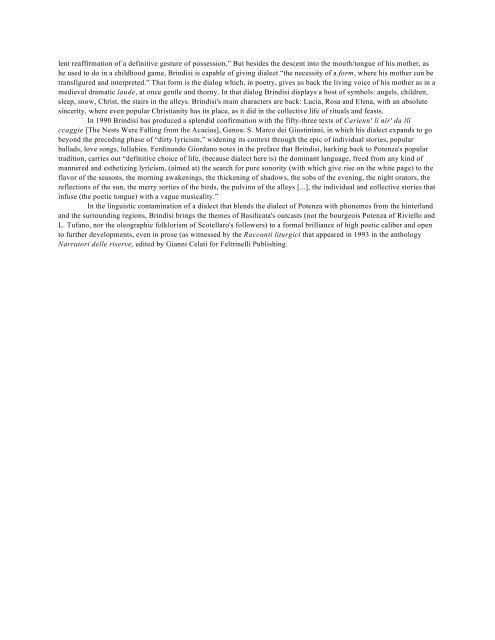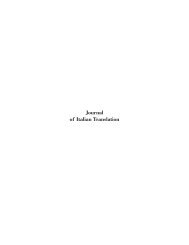Rocco Brindisi - Brooklyn College - Academic Home Page
Rocco Brindisi - Brooklyn College - Academic Home Page
Rocco Brindisi - Brooklyn College - Academic Home Page
Create successful ePaper yourself
Turn your PDF publications into a flip-book with our unique Google optimized e-Paper software.
lent reaffirmation of a definitive gesture of possession.” But besides the descent into the mouth/tongue of his mother, as<br />
he used to do in a childhood game, <strong>Brindisi</strong> is capable of giving dialect “the necessity of a form, where his mother can be<br />
transfigured and interpreted.” That form is the dialog which, in poetry, gives us back the living voice of his mother as in a<br />
medieval dramatic laude, at once gentle and thorny. In that dialog <strong>Brindisi</strong> displays a host of symbols: angels, children,<br />
sleep, snow, Christ, the stairs in the alleys. <strong>Brindisi</strong>'s main characters are back: Lucia, Rosa and Elena, with an absolute<br />
sincerity, where even popular Christianity has its place, as it did in the collective life of rituals and feasts.<br />
In 1990 <strong>Brindisi</strong> has produced a splendid confirmation with the fifty-three texts of Caríenn' li nir' da lli<br />
ccaggie [The Nests Were Falling from the Acacias], Genoa: S. Marco dei Giustiniani, in which his dialect expands to go<br />
beyond the preceding phase of “dirty lyricism,” widening its context through the epic of individual stories, popular<br />
ballads, love songs, lullabies. Ferdinando Giordano notes in the preface that <strong>Brindisi</strong>, harking back to Potenza's popular<br />
tradition, carries out “definitive choice of life, (because dialect here is) the dominant language, freed from any kind of<br />
mannered and esthetizing lyricism, (aimed at) the search for pure sonority (with which give rise on the white page) to the<br />
flavor of the seasons, the morning awakenings, the thickening of shadows, the sobs of the evening, the night orators, the<br />
reflections of the sun, the merry sorties of the birds, the pulvino of the alleys [...], the individual and collective stories that<br />
infuse (the poetic tongue) with a vague musicality.”<br />
In the linguistic contamination of a dialect that blends the dialect of Potenza with phonemes from the hinterland<br />
and the surrounding regions, <strong>Brindisi</strong> brings the themes of Basilicata's outcasts (not the bourgeois Potenza of Riviello and<br />
L. Tufano, nor the oleographic folklorism of Scotellaro's followers) to a formal brilliance of high poetic caliber and open<br />
to further developments, even in prose (as witnessed by the Racconti liturgici that appeared in 1993 in the anthology<br />
Narratori delle riserve, edited by Gianni Celati for Feltrinelli Publishing.
















